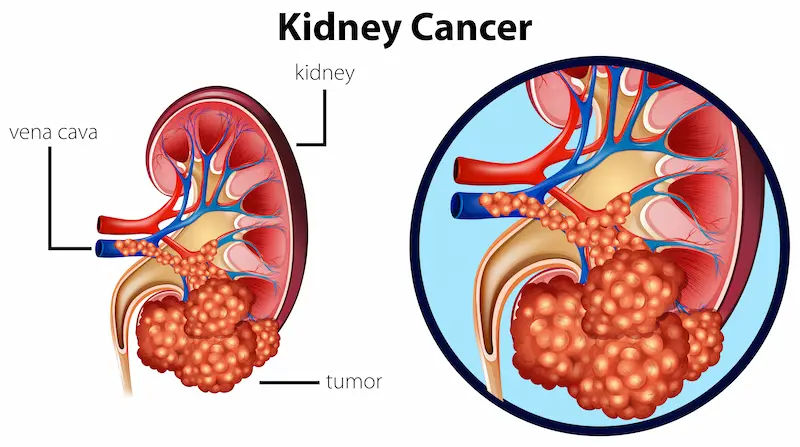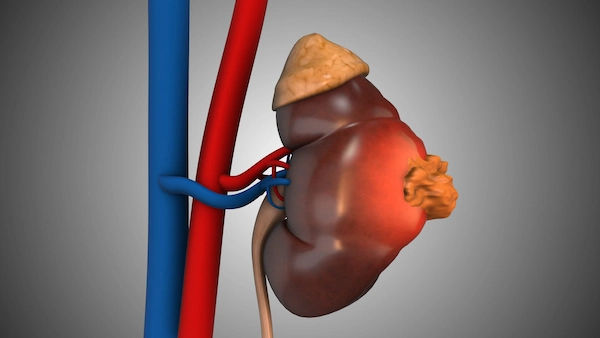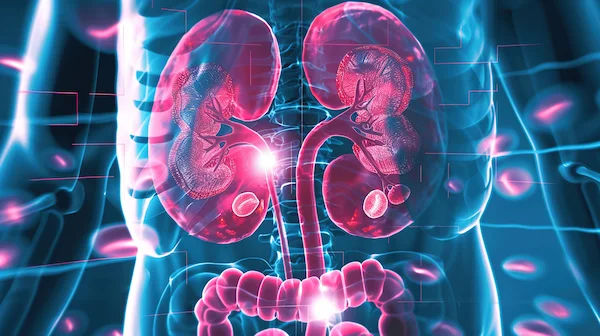Kidney Cancer: Signs and Diagnosis
Learn about kidney cancer, including its early signs, symptoms, and diagnostic methods to ensure timely detection and effective treatment.

Written by Dr. Dhankecha Mayank Dineshbhai
Reviewed by Dr. Shaik Abdul Kalam MD (Physician)
Last updated on 13th Jan, 2026

Introduction
Noticing something unusual with your health can be worrying, especially when it involves a vital organ like your kidneys. Kidney cancer, often silent in its early stages, can present with subtle signs that are easy to dismiss. This guide will walk you through the potential symptoms of kidney cancer and demystify the diagnostic process. Understanding these signs is the first step toward proactive health management. We'll cover everything from the well-known indicators to the less obvious systemic signals your body might send. More importantly, we'll clarify when it's crucial to seek professional medical advice. If you experience persistent symptoms like blood in your urine or unexplained pain, consulting a doctor online with Apollo24|7 for an initial evaluation can provide timely guidance and peace of mind.
Understanding Kidney Cancer: A Brief Overview
Gaining a clear understanding of kidney cancer is the first step toward early detection and effective treatment.
What are the Kidneys and What Do They Do?
Your two kidneys are bean-shaped organs, each about the size of a fist, located behind your abdominal organs on either side of your spine. They are your body's master filtration system, removing waste products and excess fluids from the blood to form urine. They also play a critical role in regulating blood pressure, producing red blood cells, and maintaining mineral balance.
Types of Kidney Cancer
While several types of cancer can affect the kidney, the most common by far is renal cell carcinoma (RCC), accounting for about 90% of cases. RCC begins in the lining of the kidney's tubules. Other, rarer types include transitional cell carcinoma (which starts in the renal pelvis), Wilms' tumour (a childhood kidney cancer), and renal sarcoma.
Consult a Urologist for the best advice
Early Signs and Symptoms of Kidney Cancer
Early-stage kidney cancer is often called a "silent disease" because it frequently causes no obvious signs. Many tumours are found incidentally during imaging tests for other issues, like abdominal pain or trauma. However, as the tumour grows, symptoms can develop.
The "Classic Triad" of Symptoms
The three classic signs of kidney cancer are haematuria, flank pain, and a palpable mass. However, it's rare for all three to appear simultaneously, especially in early-stage disease.
Haematuria (Blood in the Urine)
This is one of the most common symptoms of kidney tumour. The blood may be visible, turning the urine pink, red, or cola-colored (gross haematuria), or it may be microscopic, only detectable through a lab test. It's important to note that blood in the urine can come and go, which might lead someone to delay seeing a doctor. It is never a symptom to ignore.
Flank Pain
A persistent dull ache or a sharp pain in the side or lower back, below the ribs, can be a sign. This kidney cancer back pain is typically on one side and doesn't go away with changes in position or rest.
A palpable Abdominal Mass
In some cases, a lump or mass can be felt in the side or abdomen. However, due to the kidney's deep location, this is often a sign of a larger tumour and may not be detectable until the cancer is more advanced.
Paraneoplastic Syndromes: The Body's Indirect Signals
Kidney cancer is unique in that it can cause paraneoplastic syndromes, symptoms not caused by the tumour itself but by hormones or other substances the cancer cells produce. These can include:
High blood pressure (hypertension)
Night sweats
Fever
Unexplained weight loss
Loss of appetite
High calcium levels in the blood (hypercalcaemia), which can cause nausea, vomiting, and confusion.
Non-Specific General Symptoms
Many people experience general fatigue, a feeling of poor health, and persistent anaemia (low red blood cell count), which can cause tiredness and shortness of breath.
When to See a Doctor: Connecting Symptoms to Action
You should consult a doctor if you experience any persistent symptoms, especially:
Visible blood in your urine, even if it's just once.
Persistent pain in your back or side that doesn't seem related to an injury.
Unintentional weight loss.
Extreme fatigue that doesn't improve with rest.
If symptoms like blood in urine persist beyond a day or are recurrent, it is essential to seek a professional opinion. You can consult a doctor online with Apollo24|7 to discuss your symptoms and determine if further in-person investigation is needed.
How is Kidney Cancer Diagnosed? A Step-by-Step Guide
The kidney cancer diagnosis process involves several steps to confirm the presence of a tumour, identify its type, and determine its stage.
Initial Consultation and Physical Examination
Your doctor will discuss your medical history, risk factors, and symptoms. A physical exam may be conducted to check for a mass, swelling, or other signs, though small tumours are rarely felt.
Imaging Tests: The Eyes Inside Your Body
Imaging is the cornerstone of diagnosing a renal mass.
Computed Tomography (CT) Scan
This is the most important test for identifying and characterising a kidney tumour. A CT scan with contrast dye can show the size, shape, and location of a tumour and reveal if it has spread to nearby lymph nodes or organs. It's highly accurate for confirming the presence of a mass that is likely cancer.
Magnetic Resonance Imaging (MRI)
An MRI may be used if a patient cannot have a CT contrast dye (due to allergy or kidney issues) or to get a more detailed look at blood vessels around the tumour. It is particularly useful for examining blood flow and clarifying complex cases.
Ultrasound
This test uses sound waves to create images of the kidneys. It can help determine if a mass is a fluid-filled cyst (usually benign) or a solid tumour (which could be cancerous). It's often a first-line imaging test.
Biopsy: Confirming the Diagnosis
In a biopsy, a thin needle is guided into the tumour (often using CT or ultrasound imaging) to remove a small sample of tissue. A pathologist then examines the cells under a microscope to confirm the diagnosis of renal cell carcinoma and determine its grade (how aggressive the cells look). While not always needed before surgery, biopsies are crucial for planning treatment, especially for smaller tumours.
Additional Tests: Staging and Spread
Once cancer is confirmed, further tests like chest X-rays, bone scans, or additional CT scans may be done to see if the cancer has spread (metastasised), a process known as staging. Blood tests to check overall kidney function (creatinine, GFR) and overall health are also standard.
What Happens After Diagnosis? Understanding Staging
After cGet Your Health Assessed
T (tumour): Size and extent of the main tumour.
N (Node): Whether it has spread to nearby lymph nodes.
M (Metastasis): Whether it has spread to distant organs.
Staging is critical as it directly guides treatment decisions. Early-stage (I and II) cancers are confined to the kidney and have a very high cure rate with surgery. Apollo24|7 offers convenient home collection for tests like creatinine and other pre-operative blood work to help prepare for next steps.
Conclusion
Recognising the potential signs of kidney cancer is a powerful tool for your health. While symptoms like blood in the urine, flank pain, and unexplained weight loss are red flags, remember that early-stage disease often has none. This underscores the importance of paying attention to your body and not dismissing persistent changes. The diagnosis process, involving advanced imaging and sometimes a biopsy, is highly effective at identifying and characterising kidney cancer. If caught early, kidney cancer is often treatable and potentially curable. The most important takeaway is to act promptly. If you have any concerns or experience any of the symptoms discussed, don't hesitate to seek medical advice. Early detection and a clear understanding of your diagnosis are the first steps toward effective treatment and a positive outcome.
Consult a Urologist for the best advice
Consult a Urologist for the best advice

Dr. Amvrin Chatterjee
Urologist
10 Years • MBBS, MS, DNB, MCh
Kolkata
Apollo Multispeciality Hospitals , Kolkata, Kolkata

Dr Anil Kumar T
Urologist
12 Years • MBBS, MS ( General Surgery ) , MCh (Genito-Urinary Surgery , CMC Vellore) , Fellowship in Minimally Access Surgery , Fellow- ship in Uro-Oncology and Robotic Surgery, UICC Fellowship (Geneva, Switzerland).
Bengaluru
Apollo Hospitals Jayanagar, Bengaluru

Dr Karthik Maripeddi
Urologist
13 Years • MBBS MS FMAS MCh URO(OSM)
Hyderguda
Apollo Hospitals Hyderguda, Hyderguda

Dr. Shekar M G
Urologist
29 Years • MBBS, MS, MCh (Urology), DNB, MRCS, FMAS, FICRS, FICS (Urology), MNAMS, DLS, FCN, FSM, FIMSA, - Fellow (Minimal Access Surgery), Fellow (Robotic Surgery)FIAGES,FALS fellow of advance laparoscopic surgery, FAGE
Chennai
Apollo Speciality Hospitals OMR, Chennai
(100+ Patients)

Dr. Pari M R
Urologist
28 Years • MBBS, MS, Mch (Uro)
Chennai
Apollo Speciality Hospitals OMR, Chennai
(100+ Patients)


.webp)


